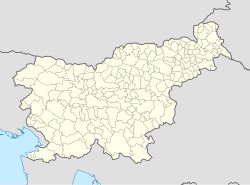Miren (pronounced [ˈmiːɾən]; Italian: Merna[3]) is an urbanized settlement in the Municipality of Miren-Kostanjevica in the Littoral region of Slovenia right next to the border with Italy.[4] The hill known as Miren Castle (Slovene: Mirenski grad) rises above the settlement to the south.
Miren | |
|---|---|
 View of Miren with Miren Castle from the Karst Plateau | |
| Coordinates: 45°53′46.15″N 13°36′25.9″E / 45.8961528°N 13.607194°E | |
| Country | |
| Traditional region | Littoral |
| Statistical region | Gorizia |
| Municipality | Miren-Kostanjevica |
| Area | |
• Total | 2.48 km2 (0.96 sq mi) |
| Elevation | 50.3 m (165.0 ft) |
| Population (2021)[1] | |
• Total | 1,506 |
| [2] | |
Name
editThe settlement was attested in written sources in 1494 as Merinach an der Wippach, and in 1523 as Japinitz oder Merina. The name is believed to have arisen through ellipsis of a noun phrase (e.g., *miren grad 'walled castle'), leaving the adjective *miren 'walled' (< *myrьnъ). If so, the name refers to the walls of Miren Castle above the settlement. A less likely theory derives the name from *Marijin 'Mary's', referring to the pilgrimage church above the settlement.[5]
History
editAfter the fall of the Roman Empire and the interlude of the Ostrogothic Kingdom, the Lombards and the Slavs settled in the area in the 6th century. The village became part of the Duchy of Friuli. It later passed to the Franks, the Bavarians and in 1500 became part of the County of Gorizia and Gradisca under the Habsburgs.
Miren suffered heavy damage during the First World War, after which it was incorporated into the Kingdom of Italy. According to the 1921 census, only around 3% of the population was Italian. In 1927, it became a municipality, absorbing the hamlets of Rupa, Peč, Gabrije and Savogna d'Isonzo. In 1947, Miren became part of Yugoslavia, though its four hamlets remained part of Italy. Since 1991, it has been part of Slovenia.
Between 1947 and 1975, the Italy-Yugoslavia border ran through Miren cemetery, cutting graves in half. The border was corrected through minor land swaps with the Treaty of Osimo, placing the entire cemetery within Yugoslav (now Slovenian) territory.[6]
Church
editThe parish church in the settlement is dedicated to Saint George and belongs to the Diocese of Koper. It was built between 1827 and 1828.[7]
Notable people
editNotable people that were born or lived in Miren include:
- Leopold Kemperle (1886–1950), journalist
- Oskar Kogoj (born 1942), industrial designer
- Vera Lestan (1908–1943), poet, pastoral worker
- Krištof Spollad (1777–1858), priest
- Marko Vuk (1947–2004), art historian
- Stanko Vuk (1912–1912), poet, writer
References
edit- ^ "Prebivalstvo po naseljih, podrobni podatki, Slovenija, 1. januar 2021". stat.si (in Slovenian). Retrieved 2 May 2022.
- ^ Statistical Office of the Republic of Slovenia
- ^ "Görz und Gradisca 1911 - K.u.K. Militärgeographisches Institut - 1:75 000 - ZONE 22 - KOL IX". Archived from the original on 2016-03-04. Retrieved 2020-04-05.
- ^ "Občina Miren – Kostanjevica – Uradna spletna stran Občine Miren – Kostanjevica" (in Slovenian). Retrieved 2021-05-07.
- ^ Snoj, Marko (2009). Etimološki slovar slovenskih zemljepisnih imen. Ljubljana: Modrijan. p. 263.
- ^ Sakalis, Alex (5 May 2023). "Skinny Smugglers, a French King's Body, and the Odd European City Home to the Other Cold War Wall". The Daily Beast. Retrieved 9 October 2023.
- ^ Roman Catholic Diocese of Koper List of Churches May 2008 Archived 2009-03-06 at the Wayback Machine
External links
edit- Media related to Miren at Wikimedia Commons
- Miren on Geopedia


